Sustainability At A Glance
Sustainability Development Policy and Framework
Believing that sustainable development and inclusive growth are the methods to establish long-term value for the Company and its stakeholders, Symphony Communication Public Company Limited, therefore, is committed to and recognizes the importance of business operations based on good corporate governance framework, environmental and social responsibility, and benefit’s consideration of all groups of stakeholders under the commitment: “Excellent Experience for ALL”, aiming to create shared value for all groups of stakeholders across the business value chain to grow together sustainably.
The company has embraced the “Sufficiency Economy Philosophy” that considers moderation, reasonableness and good self-immunity with knowledge and morality as conditions, including adopting various international principles of sustainability as guidelines for conducting business to create balance in economic, social, and environmental aspects.
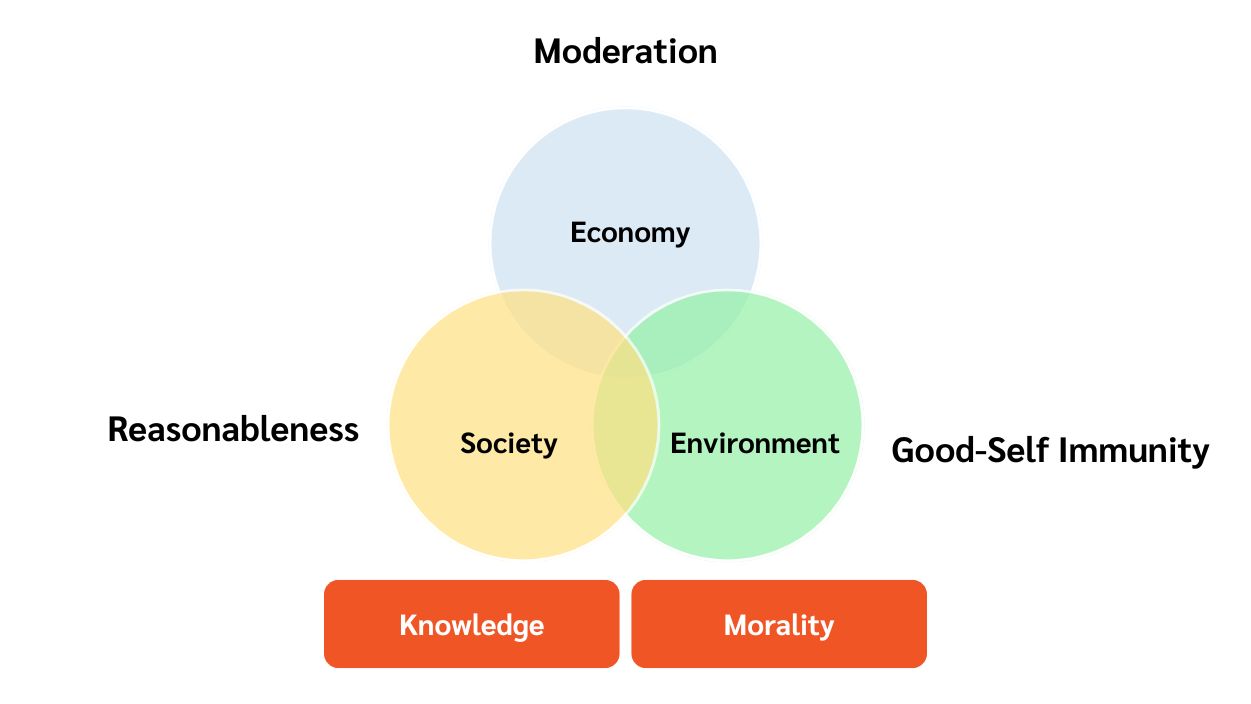
To create corporate culture of sustainability and to provide good practice for business operations, the Board of Directors has established the “Sustainability Development Policy and Framework” and has stipulated that all activities of the Company must be operated based on the Sustainability Development Policy and Framework and focus on sustainable results covering three (3) dimensions, namely: economic dimension, social dimension, and environmental dimension, in order to create shared value for stakeholders and maintain acceptance and trust of all stakeholders.
Sustainability Development Framework
The Board of Directors has established “Sustainable Development Framework” to be used as a framework for the Company in creating sustainability in environmental, social, economic and corporate governance dimension. The framework emphasizes promoting business growth through social and environmental responsibility, good governance, ethics and integrity, regulatory compliance, and efficient risk management. These efforts aim to establish a balanced and high-quality coexistence in society, while contributing to the Sustainable Development Goals (SDGs) of the United Nations and creating sustainable value for all stakeholders.
In addition to the sustainability policy and framework, the Company has adopted other standards as guidelines for sustainable development, for example the sustainability assessment criteria of the Stock Exchange of Thailand, ISO standards, the Global Reporting Initiative (GRI) Standards, in order to enhance its capability to promote sustainable development in all aspects.
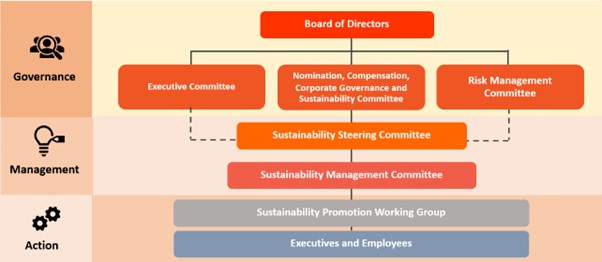
To promote and drive sustainability operation across the organization concretely and efficiently, the Board of Directors has established sustainability governance and management structure that has engaged with everyone from the Board of Directors, executives to all employees. The Board of Directors is responsible for bolstering sustainable development by overseeing to ensure that paradigm of sustainability is embedded and integrated into business operation strategy and work process in all functions; approving policies, guidelines, framework, materiality, goals, strategies and indicators, which has been preliminary screened and reviewed by the Nomination, Compensation, Corporate Governance and Sustainability Committee and the Executive Committee; monitoring and supervising work performance and disclosure of sustainability information; as well as providing advisory and recommendation to ensure that the Company meets goal achievement.
In terms of management, the Board of Directors has established the Sustainability Management Committee, consisting of executives in the level of division head and department head to drive sustainability operation and manage sustainability issues to meet with the prescribed standards and to be able to respond needs and expectation of stakeholders comprehensively by setting sustainable development strategies, roadmap, approaches and indicators; monitor to ensure that sustainability operations are on track; as well as prepare a report on sustainability performance for disclosure to stakeholders. Additionally, the Sustainability Steering Committee, consisting of senior executives with the President as the Chairman, has been appointed and has been tasked by the Board of Directors to supervise sustainability performance to be in line with the established policies and practices, provide advisory and support to the Sustainability Management Committee in all required aspects; cultivate sustainability culture by fostering cooperation and engagement in performing sustainability throughout the organization; endorse the disclosure of sustainability information; as well as report sustainability performance to the Board of Directors on a regular basis.
To ensure the integration of sustainability into day-to-day operations, clear communication, and continual improvement, the Sustainability Promotion Working Group, comprising champions or leaders who manage each sustainability issue, has been formed to perform duty in pushing, following up and coordinating with Heads of divisions and business units to convey and communicate policies, direction, strategies and action plans with employees, who play a key role in implementing the plans to achieve sustainability goals.
เพื่อขับเคลื่อนกลยุทธ์ เป้าหมาย และการดำเนินงานขององค์กรสู่การพัฒนาอย่างยั่งยืนที่ครอบคลุมและทั่วถึง บริษัท ซิมโฟนี่ คอมมูนิเคชั่น จำกัด (มหาชน) มีโครงสร้างการกำกับดูแลและการบริหารจัดการด้านความยั่งยืนที่ทุกคนมีส่วนร่วม ตั้งแต่คณะกรรมการบริษัท คณะกรรมการชุดย่อย คณะทำงาน ผู้บริหารทุกระดับและพนักงานทุกคน โดยมีคณะกรรมการบริษัทเป็นผู้กำกับดูแลสูงสุดในการให้คำแนะนำและอนุมัตินโยบาย ทิศทาง เป้าหมาย กลยุทธ์ และงบประมาณในการดำเนินงานด้านความยั่งยืน และมีคณะกรรมการสรรหา พิจารณาค่าตอบแทนและกำกับดูแลกิจการ และคณะกรรมการบริหารทำหน้าที่พิจารณากลั่นกรองเรื่องดังกล่าวในเบื้องต้น
ในส่วนของการบริหารจัดการด้านความยั่งยืนนั้น คณะกรรมการบริษัทได้อนุมัติให้แต่งตั้งคณะกรรมการจัดการความยั่งยืนองค์กร ซึ่งประกอบด้วยตัวแทนผู้บริหารจากหน่วยธุรกิจต่าง ๆ ทำหน้าที่ขับเคลื่อนการดำเนินงานด้านความยั่งยืนผ่านการกำหนดกลยุทธ์ เป้าหมาย กรอบการดำเนินงาน แนวทางบริหารจัดการ และตัวชี้วัดด้านความยั่งยืน รวมทั้งติดตามผลและประสิทธิภาพของการดำเนินงานให้เป็นไปตามแผนการดำเนินงานด้านความยั่งยืน นอกจากนี้ คณะกรรมการบริษัทได้แต่งตั้งคณะกรรมการอำนวยการความยั่งยืนองค์กร โดยมีกรรมการผู้จัดการเป็นประธาน ทำหน้าที่ให้คำปรึกษาและดูแลการดำเนินงานด้านความยั่งยืนให้สอดคล้องกับวิสัยทัศน์ นโยบาย เป้าหมาย และกลยุทธ์ด้านความยั่งยืน รวมทั้งส่งเสริม สนับสนุนและผลักดันให้เกิดความร่วมมือและการมีส่วนร่วมในการดำเนินงานด้านความยั่งยืนทั่วทั้งองค์กร ตลอดจนรายงานผลการดำเนินงานให้กับคณะกรรมการบริหารได้รับทราบอย่างสม่ำเสมอ
และเพื่อให้มั่นใจว่าการดำเนินงานด้านความยั่งยืนถูกสอดผสานไปกับวัฒนธรรมองค์กรและการดำเนินงานประจำวัน มีการสื่อสารที่ชัดเจน และมีการพัฒนาอย่างต่อเนื่อง บริษัทฯ ได้จัดตั้งคณะทำงานส่งเสริมความยั่งยืนองค์กร ซึ่งประกอบด้วยแชมเปี้ยนหรือผู้นำการบริหารจัดการความยั่งยืนองค์กรในด้านต่าง ๆ ครอบคลุมมิติเศรษฐกิจ สังคม และสิ่งแวดล้อม ทำหน้าที่รับผิดชอบในการประสานงานกับผู้บริหารสายงานและฝ่ายต่าง ๆ เพื่อช่วยในการสื่อสารกับพนักงาน ผู้ซึ่งมีบทบาทสำคัญในการนำแผนงานไปปฏิบัติเพื่อให้บรรลุเป้าหมายด้านความยั่งยืน
With the commitment: “Excellent Experience for ALL”, the Company strives to deliver excellent experience to all groups of stakeholders across the business value chain. Consequently, the Company puts the importance on stakeholders’ engagement with the belief that good relationships are based on trust. Opinions and suggestions of stakeholders are asset that will affect the goal achievement of being a good corporate citizen with sustainable growth. It will also help the Company to be able to respond to the needs of stakeholders efficiently, reduce the risk that may damage a good image and the possibility of business interruption. To create benefits and deliver value to all stakeholders, the Company communicate with stakeholders on a regular basis to create an understanding of various issues that are of interest and receive proposals from stakeholders to integrate them into the decision-making process and business planning of the company.
The Company conducts a review of its operation and engagement with stakeholders annually along with identifying and prioritizing groups of stakeholders that are important and related to the Company’s operations throughout the entire value chain including finding ways to effectively and appropriately respond to expectations and issues arisen form stakeholders.
The stakeholders of the Company have been classified into eight groups by taking into consideration of their relation to the Company’s business, sustainability impacts from stakeholders towards the Company, and impacts from the Company’s business operations towards stakeholders, namely: customers, employees, business partners, suppliers, shareholders/investors, government/regulatory agencies, creditors, and communities and society.
Symphony Communication Public Company Limited attaches importance to the management of both internal and external sustainability issues and has thus instituted a materiality assessment and prioritization process in compliance with the Standards of the Global Reporting Initiative (GRI). The Company compiles and assesses issues related to sustainable development through materiality assessment, which places emphasis on the context of sustainability, global and regional trends, direction in the Telecommunication industry, while taking into account the Company’s operational strategies and risk factors both at present and in the future that may provide impacts or create opportunities for the Company’s business operations.
Materiality Assessment Process
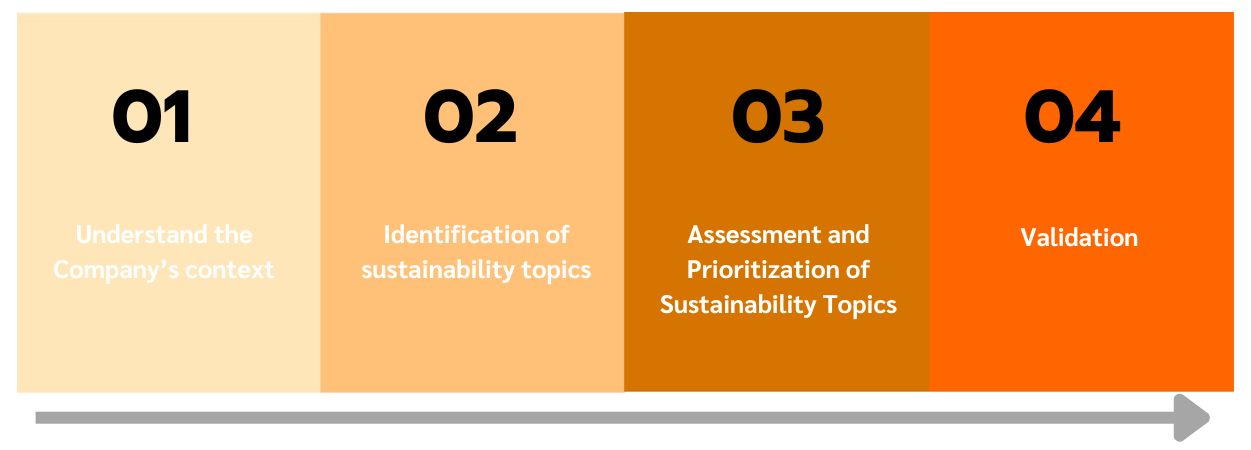
- Understanding organization’s context
Study and analyze the sustainability context of the Company, taking into consideration of both internal and external factors, including changes in global and regional trends, sustainability trends and directions, materiality of peers in the industry, topics prescribed in industry standards, and issues of global concern.
- Identification
Gather topics through the consideration and analysis of perspectives on expectations, interests, and concerns and issues raised by all groups of stakeholders throughout the value chain, both internal and external, as well as changes in global trends and the industry, past events, risk factors with potential impacts in the future, business opportunities, and human rights principles. Then, identify sustainability topics that positively and negatively impact the Company’s sustainability and group them into environmental, social, and economic and corporate governance topics (ESG topics).
- Assessment and Prioritization
Incorporated the identified sustainability topics into the materiality assessment and prioritization process, referring to the Double Materiality and Multi-stakeholder Approach, in order to see the overview of the impact of business operations, both financial and non-financial on stakeholders, including society and environment (Outward Impact) and impact on the Company’s business operations (Inward Impact), through online surveys and interview of purposively selected external stakeholders and online surveys for internal stakeholders. Data obtained from stakeholders is analyzed into scores for material sustainability topics based on level of severity and likelihood of impacts on the Company and stakeholders, both negative and positive. Material sustainability topics were determined and presented their significance in the Materiality Matrix by defining the vertical axis (Y axis) to represent the level of impact and significance of ESG topics toward stakeholders and the horizontal axis (X axis) to represent the level of impact and significance of ESG topics toward the Company’s business operations.
- Validation
Results of assessment and prioritization of the sustainability topics shall be presented to senior executives in order to consider, review, and validate to ensure that the material sustainability topics are in line with the Company’s context, strategies and goals before formulating strategies and management approaches and assigning to the relevant divisions/departments, under the helps and support of champions, to carry out further.
In this regard, the Board of Directors, after being considering and screening by the Sustainability Steering Committee and the Executive Committee, is responsible for approving the content of the material sustainability topics.
Material Sustainability Issues Assessment Results
In 2022, the Company had a total of 20 sustainability topics and categorized the topics into 3 levels according to the significance of their impacts on the Company and stakeholders, namely, very critical material topics, moderately critical material topics, and less critical material topics.
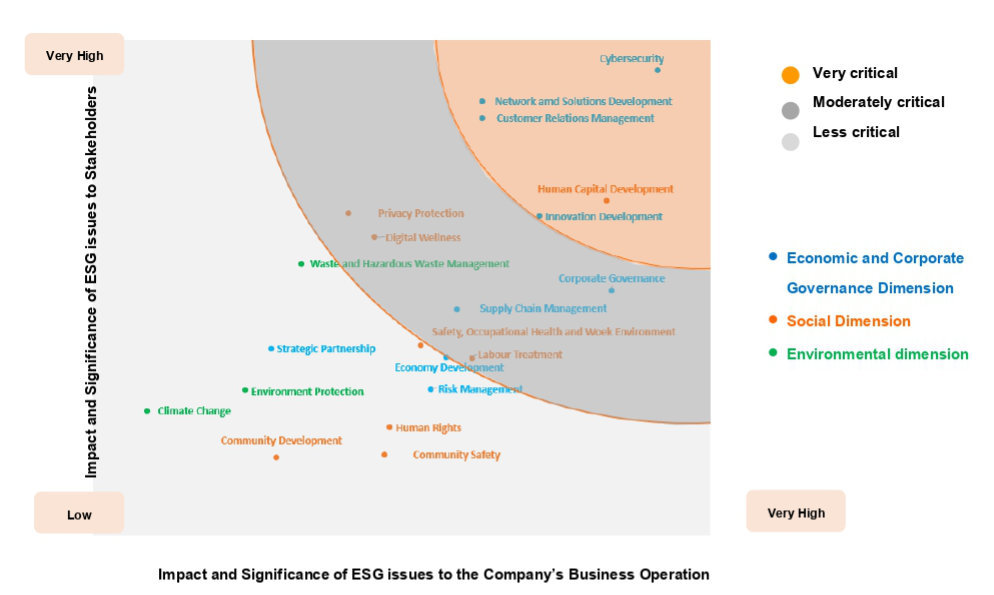
Summary of the Key Sustainability Issues (  Material Issues)
Material Issues)
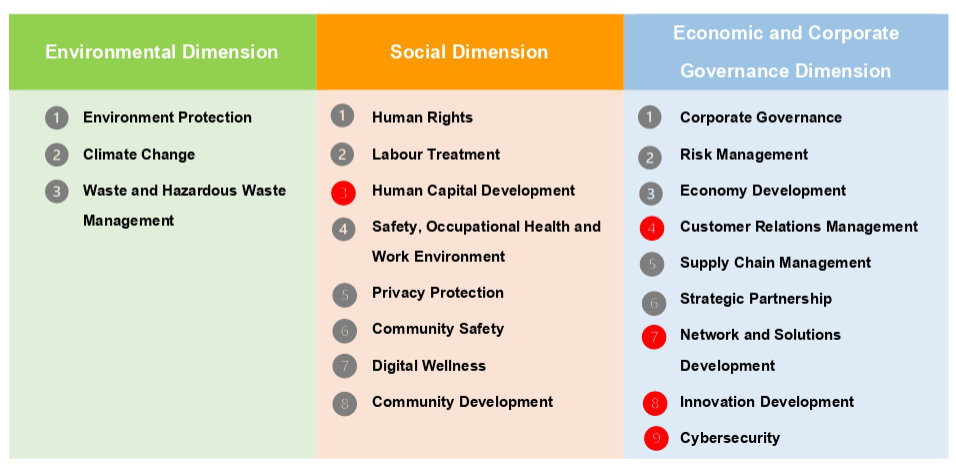
Experience for ALL” that strives for creation of value for all groups of stakeholders across the value chain, enhancement quality of life of people along with being friendly-environmental organization to support sustainable existence of our planet. Hence, the Company has defined the sustainable development strategies covering economic, social, and environment as well as, good corporate governance, focusing on development of business toward sustainability and contribution to the Sustainable Development Goals (SDGs) of the United Nations.
เป้าหมาย กลยุทธ์และแนวทางการบริหารจัดการด้านความยั่งยืน_EN
| Sustainability Development Framework | Commitment | Goals | Strategies and Management Approaches | Contribution to UNSDGs |
| Economic Dimension | To be a corporate citizen that creates value and sustainable growth for all stakeholders, including supporting the development and mobilization of Thailand's digital economy and society through its solid and intelligent telecommunication infrastructure. |
• Revenue and operating profits grow steadily and continuously. • Intelligent network routes cover all areas throughout the country. • Ability to provide products and services that meet all customers’ needs. • Overall annual customers satisfaction at 95% • 100% of suppliers acknowledge Supplier Code of Conduct • Maintain corporate governance rating at “Excellent” or “5-Star) recognitive level continuously every year. • Success in continuously being certified as a member of the Thai Private Sector Collective Action against Corruption (CAC). |
• Conduct business in a transparent, auditable, and responsible manner under the good corporate governance principles. • Follow business ethics and oppose all forms of corruption. • Manage risks effectively according to international standards. • Find funding sources and manage finances carefully. • Invest in enhancing network efficiency with innovation and cutting-edge technology. • Invest in expanding network to cover all areas to create economic growth. • Promote innovation development to enhance products and services, service quality and operational efficiency. • Deliver services to customers in a responsible manner. • Consistently manage customer relationships and satisfaction. • Promote collaboration with strategic partners to expand new business opportunities and to deliver a diverse range of solutions suiting customers’ needs. • Build relationships with suppliers and business partners to create sustainable mutual benefits for all parties. • Maintain resiliency for data security and cyber security. • Integrate sustainable development into its operational activities. |
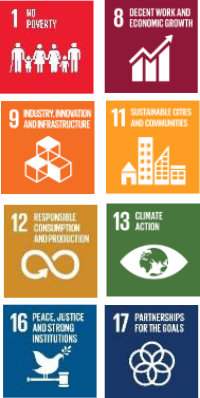 |
| Social Dimension | To be a responsible corporate citizen to enhance social wellbeing sustainably. |
• Employee engagement score of not less than 85% • Decrease of employee turnover rate. • Zero work accident • 100% of people in society can access basic services, information and technologies |
• Respect human rights and labor rights. • Treat labor fairly, in conformity to and beyond labor standards, regulations, and laws. • Promote diversity and equitable treatment of each other regardless of any differences. • Manage human resources efficiently. • Enhance human capital capacity by supporting training and necessary resources. • Promote wellbeing of employees. • Promote good management system of occupational health, safety and working environment. • Protect personal data and privacy of all groups of stakeholders. • Invest in expanding network coverage to provide inclusive digital access to basic services and information to promote social wellbeing. • Support and promote employees, including business partners and suppliers to have awareness of social responsibility. • Promote the Company’s engagement with communities and related stakeholders to build relationship, create understanding and strong cooperation. |
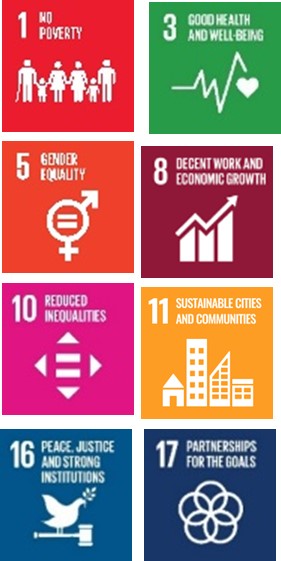 |
| Environmental Dimension | To be a corporate citizen that operates its business with friendly-environmental manner. |
• Reduce consumption of electricity and fuel energy from operations. • Reduce paper used in the office. • Reduce amount of waste from business operation. • Reduce greenhouse gas emissions intensity to meet Net Zero target in 2050. |
• Strictly comply with environmental laws and regulations. • Set up measures to reduce energy consumption, including seeking alternative energy sources to replace consumption of electrical energy and fuel energy from business operations. • Promote green procurement and green service. • Control the amount of paper used and adopt technology to reduce the amount of paper used. • Reduce and properly eliminate waste from operational activities. • Support our customers and supply chain to reduce environmental footprint. • Cooperate with both government and private sectors in trying to reduce the increase in global temperature. • Promote cooperation in environmental preservation and conservation of natural resources between the Company and various agencies, both the public and private sectors. • Raise awareness and instill a sense of environmental responsibility among employees through communication and training to provide knowledge about environmental issues that are significant to the sustainability of the organization. |
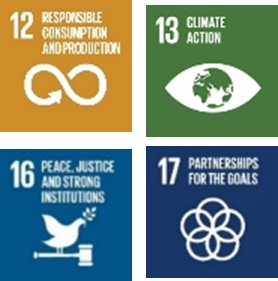 |


